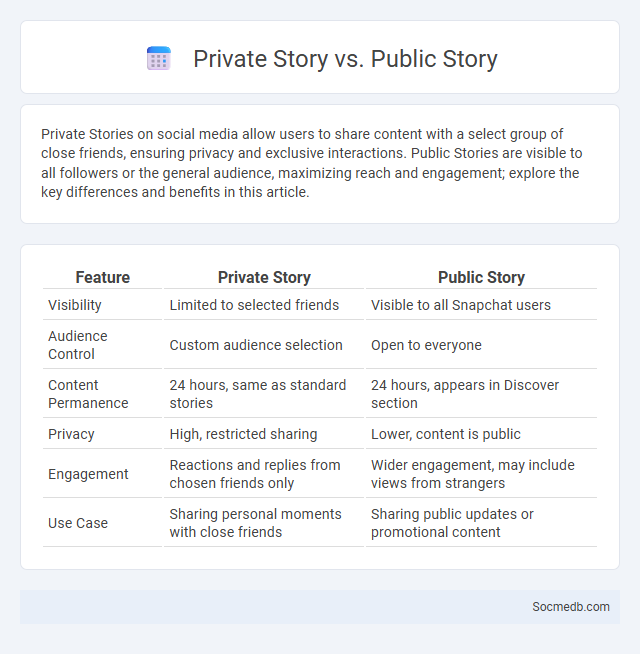
Photo illustration: Private Story vs Public Story
Private Stories on social media allow users to share content with a select group of close friends, ensuring privacy and exclusive interactions. Public Stories are visible to all followers or the general audience, maximizing reach and engagement; explore the key differences and benefits in this article.
Table of Comparison
| Feature | Private Story | Public Story |
|---|---|---|
| Visibility | Limited to selected friends | Visible to all Snapchat users |
| Audience Control | Custom audience selection | Open to everyone |
| Content Permanence | 24 hours, same as standard stories | 24 hours, appears in Discover section |
| Privacy | High, restricted sharing | Lower, content is public |
| Engagement | Reactions and replies from chosen friends only | Wider engagement, may include views from strangers |
| Use Case | Sharing personal moments with close friends | Sharing public updates or promotional content |
Understanding Private Stories: Definition and Purpose
Private Stories on social media are exclusive, short-lived content shared with a select group of followers or friends, allowing users to control who views their personal updates. These stories enhance privacy by limiting audience reach and fostering more intimate sharing experiences compared to public posts. Brands and individuals leverage Private Stories to build closer connections, share behind-the-scenes content, and maintain user engagement within targeted circles.
What Are Public Stories? Key Features Explained
Public Stories on social media are temporary posts visible to a broad audience beyond your direct followers, often lasting 24 hours. Key features include the ability to share multimedia content like photos and videos, interactive elements such as polls or questions, and privacy settings that can restrict or allow different viewer groups. These stories enhance engagement by providing real-time updates and fostering a sense of immediacy and connection.
Private Story vs Public Story: Core Differences
Private Story features on social media allow users to share content exclusively with a selected group of friends, enhancing privacy and control over who views the posts. Public Story, in contrast, broadcasts to all followers or the general audience, maximizing reach but reducing content discretion. The choice between Private and Public Story directly impacts user engagement, audience targeting, and content visibility.
Privacy Settings: Controlling Who Sees Your Content
Privacy settings on social media platforms allow you to control who can view your posts, photos, and personal information, enhancing your security and online presence management. By customizing these settings, you restrict access to your content to selected friends, followers, or specific groups, preventing unwanted exposure. Regularly updating your privacy preferences ensures your data remains protected against unauthorized access and aligns with your comfort level regarding information sharing.
Audience Engagement: Private vs Public Story Impact
Audience engagement varies significantly between private and public social media stories, with private stories fostering a sense of exclusivity and intimacy that encourages more authentic interactions and higher engagement rates. Public stories reach a broader audience, increasing visibility and potential reach but often resulting in less personal connection and lower individual engagement. Understanding the impact of your story's privacy setting allows you to tailor content that maximizes interaction based on your communication goals and target audience.
Security Concerns on Private and Public Stories
Social media platforms pose significant security concerns for both private and public stories, as unauthorized access can lead to personal data breaches and identity theft. You must be cautious about privacy settings to control who can view your content, ensuring that sensitive information in private stories remains protected from hackers and unwanted viewers. Public stories, while offering wider reach, increase the risk of exposure to malicious activities such as phishing scams and impersonation attacks.
When to Use a Private Story: Ideal Scenarios
Private stories on social media platforms are ideal for sharing personal moments with close friends or family without broadcasting to your entire follower list. Use a private story when you want to provide updates, behind-the-scenes content, or special announcements that are relevant only to a select group. Your private story enhances privacy while maintaining genuine, targeted engagement within your trusted circle.
When to Opt for a Public Story: Best Practices
Opt for a public story on social media when aiming to increase brand visibility, engage a broader audience, or share content that is relevant and accessible to all followers. Best practices include posting timely updates, trending topics, or promotional campaigns that benefit from maximum reach and interaction. Ensure the content aligns with your brand identity while maintaining privacy standards and avoiding sensitive information.
Managing Multiple Stories: Tips for Efficiency
Managing multiple social media stories efficiently requires scheduling tools like Buffer or Hootsuite to streamline content posting and maintain consistent engagement. Utilize analytics to track story performance, allowing for data-driven adjustments to optimize reach and interaction. Batch content creation saves time and ensures a cohesive narrative across platforms, enhancing brand visibility and audience retention.
Choosing the Right Story Type for Your Needs
Selecting the right story type on social media depends on your content goals, audience preferences, and platform features. Interactive stories, such as polls or Q&A sessions, boost engagement, while visual narratives like images or videos enhance brand storytelling and emotional connection. Tailoring your story type to match your audience's behavior increases reach and maximizes the impact of your message.
 socmedb.com
socmedb.com